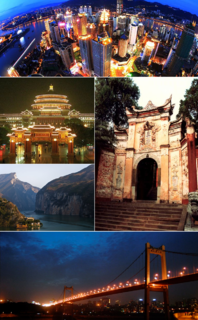This is a list of prisons in Chongqing, China . [1]

Chongqing, formerly romanized as Chungking, is a major city in southwest China. Administratively, it is one of China's four municipalities under the direct administration of central government, and the only such municipality in China located far away from the coast.

China, officially the People's Republic of China (PRC), is a country in East Asia and the world's most populous country, with a population of around 1.404 billion. Covering approximately 9,600,000 square kilometers (3,700,000 sq mi), it is the third- or fourth-largest country by total area. Governed by the Communist Party of China, the state exercises jurisdiction over 22 provinces, five autonomous regions, four direct-controlled municipalities, and the special administrative regions of Hong Kong and Macau.
| Name | Enterprise name | City/County/District | Village/Town | Established | Notes |
|---|---|---|---|---|---|
| Chongqing Juvenile Offender Detachment | Jiangbei District | Maojiashan | 1954 | manufactures polystyrene products, printing goods | |
| Chongqing Prison | Xinshang Laodong Plant, Xinsheng Electronics Corporation | Nan'an District | Danzishi | ||
| Chongqing Women's Prison | Yongchuan District | Yueqinba, Honglu Town | holds about 2000 inmates, has shoe manufacturing and clothing workshops | ||
| Fengcheng Prison | Brickyard | Changshou District | Yanjia | more than 1800 prisoners in 2004 | |
| Fuling Prison | Fuling No. 2 Flax Mill | Fuling | Shilukou, Guixi, Dianjiang County | ||
| Jinhua Prison | Tea Factory; Plywood Board Factory | Zhong County | Jinghuashan, Huangqin | ||
| Jiulong Prison | Jiulongpo District | Yueyuan, Zouma Town | |||
| Nanchuan Prison | Nanchuan District | Shuijang | |||
| Sanhe Prison | Wanzhou Binjiang Construction Engineering Company | Wanzhou District | Fenshui | ||
| Sanxia Prison | Chongqing Dingjian Business | Wanzhou District | Changtan | Business established in 2004 | |
| Yongchuan Prison | Xinsheng Tea Farm | Yongchuan District | Zhongbacun | 1952 | Xinsheng Tea Farm is the largest tea farm in China, produces Yuzhou Tea, Bi Luochun green tea, Yinzhen tea and Mao Feng tea. Yearly total of about a thousand inmates |
| Yuzhou Prison | Jiangbei District | Tangjiatuo | Holds political prisoners and Falun Gong persons, meals and toilets are in the same room | ||




